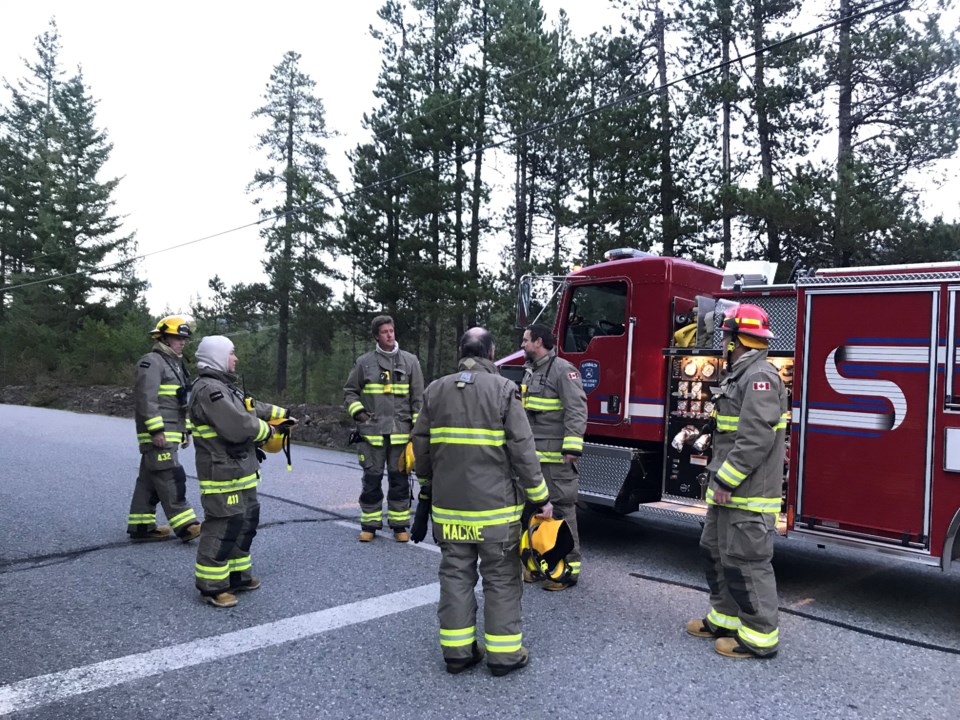With its current fleet of vehicles, navigating Forest Service Roads to respond to calls can be challenging for the Garibaldi Volunteer Fire Department (GVFD) and its 20 members.
But thanks to a $20,000 grant from the Whistler Blackcomb Foundation, the GFVD will soon be able to purchase a rapid response wildland fire truck to help serve its roughly 2,160 hectares of terrain south of Whistler.
“While we can typically get to where we need to be, our current vehicles make this difficult and slower as it is not their primary design,” said GVFD Captain Joe McDermid in an email. “Our more rugged vehicles do not currently have the water carrying capacity this new truck will provide. Overall, this new truck just makes us faster and better at providing service within our area.”
The GVFD gets the bulk of its funding from the Squamish-Lillooet Regional District, as well as its own fundraising events. But with COVID-19 throwing a wrench in those efforts in recent years, the Whistler Blackcomb Foundation (WBF) funding is especially helpful.
“We sincerely appreciate the grant from the WBF,” McDermid said. “Their generosity allows us to improve our service response times to the public within our callout area, which makes the community that much safer.”
The grant was just one of several awarded to Sea to Sky groups by the WBF earlier this month—more than $400,000 in total.
When the pandemic hit in March 2020, the foundation shifted its focus to the most pressing needs in the corridor, said executive director Mei Madden, including food banks, emergency shelters, mental health programs and more.
“We also didn’t follow our usual protocol of an application process and instead, it was often just a phone call and conversation about what was needed,” Madden said, adding that the new process enabled the foundation to disperse funds—about $800,000 in the last year—to organizations in a more timely manner.
But with the urgent need brought about by the pandemic waning, the WBF returned to its standard application process in October.
“It is so rewarding to disburse these funds to some amazing local non-profits, especially after a long wait while we put the needs of pandemic-relief at the forefront,” Madden said.
“There were some projects put on hold and we are so thrilled for these organizations to be able to move forward.”
At the Whistler Museum and Archives, a $12,000 grant will be used to purchase equipment to digitize 16-millimetre film in the museum’s collection.
“We received a large collection from George Benjamin which has a lot of avalanche control during the 1970s … and there’s other ski films and promotional films that were developed for Whistler over the years that we have in 16mm that we’re going to digitize,” said Brad Nichols, executive director and curator of the Whistler Museum, adding that the museum has “close to 100 reels” of 16-mm film in its collection.
With the new equipment, the museum can better preserve its collection for future generations, as well as make it more accessible to the general public, Nichols said.
“Some of this film hasn’t been seen in public in close to 30, 40 years … We’re really excited for that,” he said.
The museum also plans to share the equipment with other museums and cultural institutions, or even members of the public wishing to digitize their own film, Nichols said.
Other grant recipients include the Spearhead Huts Society ($75,000); Pemberton Fire Rescue ($68,000); Zero Ceiling ($50,000); Pemberton Search and Rescue ($20,000); Whistler Waldorf School ($20,000); the Squamish Hospital Foundation ($15,000); and Pemberton Secondary School’s outdoor program ($7,000), along with several others.
The WBF has awarded more than $15 million to community organizations since 1992. About 80 per cent of its funds are generated through its two major fundraising events: the Telus Golf Classic and Telus Winter Classic, both of which had to be reimagined this year due to COVID.
This year’s Winter Classic is set for March 4 and 5, 2022. Find more info at whistlerblackcombfoundation.com.




